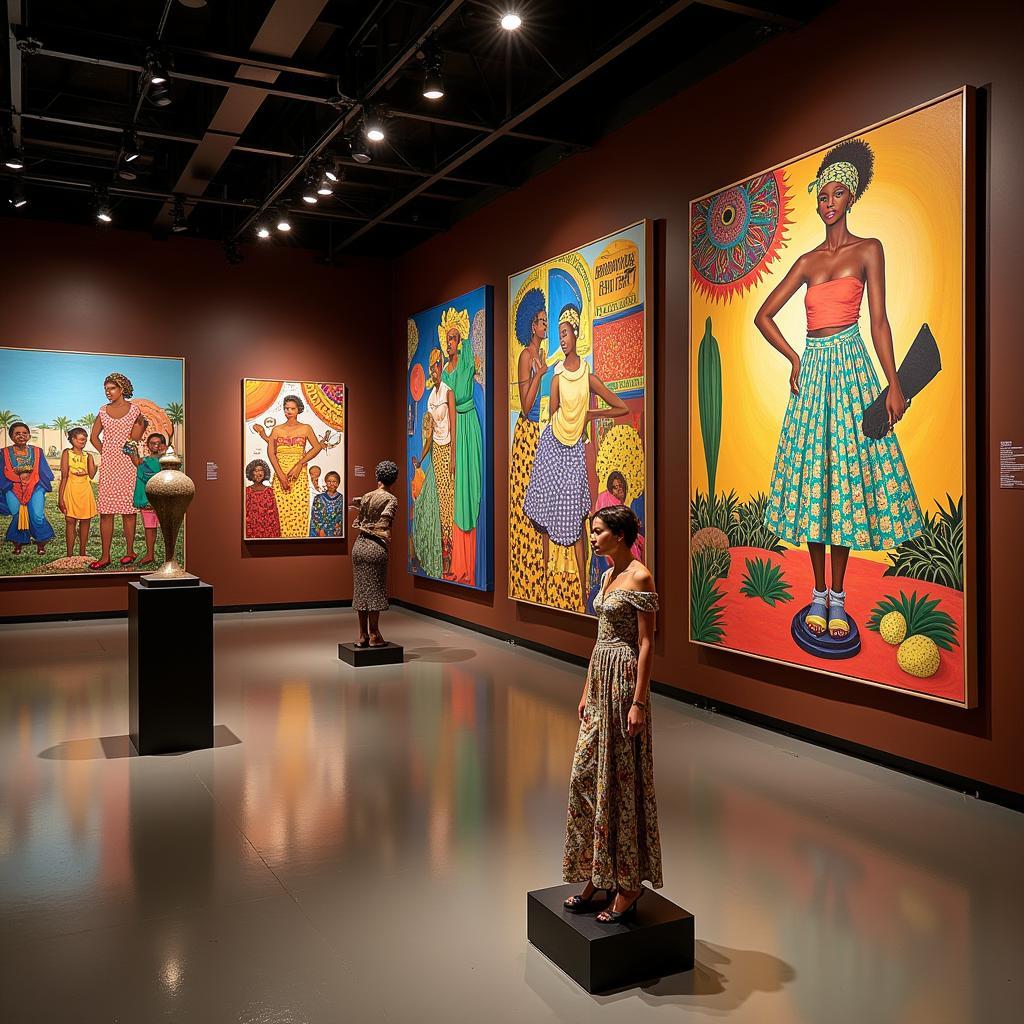The Ultimate Guide to African Hair Stores: A Journey Through the World of Black Beauty
African Hair Stores are more than just places to buy hair products. They’re cultural hubs, community centers, and sources of empowerment for people of African descent. They offer a vast selection of products, from weaves and wigs to hair care essentials and styling tools, catering to the diverse needs of the Black hair community.
Navigating the World of African Hair: A Deep Dive
African hair stores are filled with a wide array of products, each designed to address specific hair textures and needs. It can be overwhelming for newcomers, so let’s break down the essentials:
Hair Extensions
- Weaves: These are bundles of human or synthetic hair, used to create various hairstyles. You’ll find options like Brazilian, Peruvian, Malaysian, and Indian hair, each with its own unique texture and characteristics.
- Wigs: Pre-styled hairpieces, perfect for instant style transformations. They come in various lengths, colors, and textures, from sleek bobs to voluminous curls.
- Braiding Hair: Synthetic hair designed for braiding, creating protective styles that last for weeks. Popular options include Kanekalon, X-pression, and Marley hair.
Hair Care Essentials
- Shampoos and Conditioners: Designed for specific hair textures and concerns, such as moisturizing, strengthening, and detangling.
- Hair Oils and Butters: Provide deep hydration and nourishment, helping to combat dryness and breakage. Look for oils like coconut, argan, and castor, and butters like shea and mango.
- Hair Growth Products: Products containing ingredients like rosemary oil, peppermint oil, and biotin, formulated to stimulate hair growth and strengthen follicles.
Styling Tools
- Curlers and Straighteners: For heat styling, choosing the right tool depends on your hair texture and desired result.
- Combs and Brushes: Essential for detangling, styling, and maintaining hair health.
- Hair Accessories: Headbands, scarves, clips, and other accessories to complement your hairstyle.
Understanding Hair Textures and Needs
“There are so many different types of African hair, each with unique needs,” explains Dr. Abena Addo, a renowned trichologist specializing in African hair. “Understanding your hair type is crucial for choosing the right products and styling techniques.”
- Type 4 Hair: The most common hair texture in African communities, characterized by coily and kinky patterns. Type 4 hair needs moisture, gentle detangling techniques, and protective styles.
- Type 3 Hair: Curly and coily, this texture ranges from loose curls to tight coils. Type 3 hair benefits from deep conditioning, moisturizing products, and styles that enhance curls.
- Type 2 Hair: Wavy and looser curls, often more manageable than other types. However, Type 2 hair can still experience dryness and frizz.
The Importance of African Hair Stores
African hair stores are vital to the Black community for several reasons:
- Representation: They offer a welcoming space where customers can find products specifically designed for their hair texture and needs.
- Community: Beyond the products, African hair stores often act as community centers, fostering a sense of belonging and sharing knowledge.
- Empowerment: They allow individuals to express their individuality and embrace their natural hair, celebrating its unique beauty.
Finding the Perfect African Hair Store
Here are some tips for finding the best African hair store near you:
- Ask for Recommendations: Talk to friends, family, and other members of the Black community for their recommendations.
- Online Reviews: Read customer reviews on Google, Yelp, and other platforms to get a sense of the store’s reputation.
- Visit the Store: Take a trip to the store to see the environment, browse the products, and talk to the staff.
Frequently Asked Questions
Q: What are some of the best African hair products on the market?
A: The best products for African hair vary depending on your individual needs and preferences. However, some popular brands known for their effectiveness and quality include SheaMoisture, Cantu, Aunt Jackie’s, and ORS.
Q: What are some common mistakes to avoid when caring for African hair?
A: Over-washing, using harsh chemicals, and heat styling without proper protection can damage African hair. It’s important to moisturize regularly, detangle gently, and use heat styling tools sparingly.
Q: How can I find a skilled hairstylist who specializes in African hair?
A: Ask for recommendations from trusted sources, look for online reviews, and check out stylists’ portfolios to see their work on different hair textures.
Q: What are some protective hairstyles for African hair?
A: Braids, twists, locs, and updos are great protective styles that minimize manipulation and breakage.
Q: Where can I learn more about African hair care?
A: There are many resources online and in your local community. Look for blogs, websites, and YouTube channels dedicated to African hair care. You can also join online forums and communities to connect with other people who share your hair type and concerns.
Conclusion
African hair stores are vital to the Black community, providing access to a wide range of products and fostering a sense of belonging. Embrace the journey of discovering the perfect products and styles for your unique hair texture.
